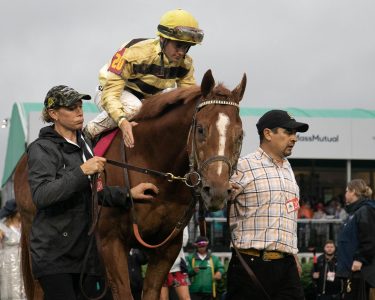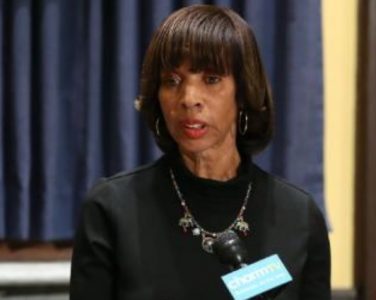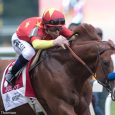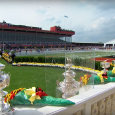The winter of 2018-2019 has been a difficult one for the sport of horse racing, aka the Sport of Kings. It has suffered from horse shortages, drug issues and 23 horses died at Santa Anita after record-setting rains.
The first Saturday of May is the Kentucky Derby and, for one day, those who love horse racing look to that day as a reprieve. For one day, all is usually right in the horse racing world. There were 150,000 people at Churchill Downs — 10.9 percent of the country watching — and, at 6:45 pm, when the horses were loading, that rating jumped to 11.9.
What does this tell us? It tells us that Americans like big events and despite all of the warts that horse racing offers, almost 12 percent of America was watching what many call the greatest two minutes in sports. In short, there aren’t many great American events left. At the end of the month sits the Indianapolis 500; last year, just 3.6 percent of America watched. Hopefully, the Kentucky Derby does not become the Indianapolis 500.

Country House
When 12 percent of the nation is watching, you want things to go right, you want things to run smoothly and you want things to be free of controversy. Of course, that didn’t happen. Some say that the sport of horse racing is snake bit, but often, much of the damage is self-inflicted.
Many say there needs to be a national governing body, a commissioner and uniform rules on drugs, whips and everything else in between. They say this without any knowledge of how the sport is regulated. Today it’s easy to just spout off without facts or any knowledge.
Horse racing is regulated by the states. Yes, the rules are different in New York than they are in Pennsylvania. Could the states work together to address some of the sport’s problems? Of course they could, but in many states, the counties don’t play nice, so good luck thinking New York, Kentucky and California can get on the same page.
The states compete against each other because they want those revenues. New York wants horse people to race in New York, stable in New York and establish residency in New York. California wants the same.
Horse racing will never be the NHL with a Board of Governors that focuses on the best interests of the sport. It isn’t going to happen — and, contrary to what most think, that’s probably a good thing. Let each state decide what’s best for its needs and issues. The goal is to make the sport as safe as it can be, but often that’s not easy to do.
Horse racing needs horses. The more horses, the more racing; and with more racing comes more wagering, so making the sport safer is paramount. Without wagering, the sport dies and that’s what makes the Derby fiasco even more difficult to stomach. In other sports, most people are just watching and enjoying the games, while just about everybody who watches a horse race has some dust on it.
Sports like the NFL, MLB and NHL make money by having people in their playpens. Horse racing does not. In fact, if horse racing relied solely on gate revenue, it would have died decades ago. Horse racing relies on wagering and most of that comes from off-track sources.
That’s what made the Derby so frustrating. For about a week — Derby, Preakness, Belmont and Breeder’s Cup — horse racing looks like a real sport. The stands are packed, there are celebrities feigning interest and NBC is there to broadcast it with 12 percent of the country tuned in. What they saw this year was a horse dominate only to be taken down for impeding the progress of others.
The stewards probably made the right decision; they followed the rules and the letter of the law. But like the NFC Championship Game, instead of celebrating Country House and the team that won, the Rams, we are laying blame for what happened.
In 2015, America celebrated as American Pharoah won the Triple Crown, the first in 37 years. Last year, Justify did the same and, while America didn’t celebrate as much as 2015, they still watched and paid attention. That’s what the sport craves.
This winter, we haven’t gotten many feel-good moments. Santa Anita suffered from those torrential rains and, before March had ended, 23 horses had died on its grounds. That stoked PETA and those that think horse racing is inhumane.
Now this.
The question is simple: Can the sport get out of its own way?
The Triple Crown now heads to Pimlico Race Course in Baltimore, Maryland. Pimlico is falling apart by the minute. In a word, the place is a dump. The Stronach family owns Pimlico. They also own Gulfstream Park in Florida and Laurel Racetrack, 30 miles southwest from Pimlico. They want to move the Preakness to Laurel, a track that they have spent over $100 million to fix up.
The city of Baltimore wants the Preakness to stay at Pimlico and prefers a massive renovation or complete rebuild. The city and state of Maryland don’t have any money to chip in and the Stronachs are unwilling to help. And, a few weeks ago, 7,000 seats at the track they call Old Hilltop were deemed unsafe and will be roped off on May 18.
Sadly, that’s not all. Maryland law says that if the Preakness is run in the state, it has to be run in Baltimore City (as it is called by its natives). So, if the Stronachs move the race to Laurel, they’ll likely face litigation and they’ll never get another dime from any political body in the Old Line State.

Catherine Pugh, ex-mayor of Baltimore (photo via Youtube).
It gets worse. The Stronachs are conducting their own Family Feud. Frank Stronach is the patriarch. His daughter Belinda is the CEO and right now, they have sued each other. I’m not sure why, nor do I care, but it’s never good when a father sues his own daughter.
Mayor Catherine Pugh cited the Stronach family discord as a reason for blocking any move of the Preakness from Baltimore to Laurel. She never gave solid reasons other than the saying that the Preakness belongs in Baltimore and always should be.
Well, Ms. Pugh is no longer the mayor of Baltimore. She was alleged to be involved in a scandal over children’s books and, on May 2, she resigned. She had her house raided by the FBI and she could face charges and possible prison time.
So let’s recap recent events in bullet form:
- Long winter with 23 deaths at Santa Anita.
- Fighting over drugs, use of whips and ways to make horse racing safer.
- Controversial result in the Kentucky Derby.
- Dumpy and dilapidated Pimlico.
- The battle over where the Preakness should be run.
- The Stronach Family Feud.
- The resignation of Baltimore Mayor Catherine Pugh.
What else can happen in the days leading up to the Preakness? Instead of the sport focusing on the second leg of the Triple Crown, we have all this stuff going on. What we need is for both Maximum Security and Country House to get to Baltimore and be ready to run on the third Saturday in May. But guess what? Neither Maximum Security nor Country House will race in the Preakness. The latter got sick after the Derby, while the former’s owner is very upset that his horse was taken down. And while there really isn’t a sound reason for “Security,” to run, I always thought redemption was a pretty decent one.
Had Maximum Security won the Derby, he would have been the big favorite to win the Preakness. And usually when the best horse wins the Derby, they carry that momentum right through Baltimore. The high usually comes crashing down in the Belmont, but in 2015 and 2018, that didn’t happen. Conventional wisdom also says that longshots that win the Derby usually falter badly in the Preakness and something tells me Country House would have fallen into that category. Now, we’ll never know, because neither horse is coming to Charm City.
This has been a boggling 2018-2019 season for horse racing — and it’s only May. There could be more surprises in store as we head to Pimlico and beyond.
Maybe the drama is good; perhaps, it will draw more viewers in two weeks. Maybe some people love this form of chaos. I’m sure those who truly love the sport want a nice, calm, uneventful, but great, race. They want to see a clean race with two, three or even four horses hitting the line together.
We know when horse racing is clicking, the drama is second to none. We saw that in 1973, 1978, 1997, 1998 and 2004 when horses were denied Triple Crowns by the slightest of margins. But, lately, that hasn’t been the case as horse racing continues to draw attention for the wrong reasons. And, now, the trail heads to troubled Pimlico for the 144th running of the famed Preakness Stakes.
What happens next is anybody’s guess.




